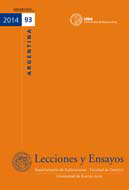On the Criterion for Distinguishing Between the Interruption of Life-Saving Causal Chains Initiated by Third Parties or by Nature, and Direct Causation
Keywords:
interruption of causal salvation courses, crimes of omission, causation, legal causation, commission by omissionAbstract
Criminal law theory tends to distinguish between direct causation and interruption of causal salvation courses. The latter category, nonetheless, has been analyzed on a case-by-case basis which has given rise to a series of systematic difficulties. Accordingly, in this article I will try to demonstrate that this traditional distinction is highly problematic. For that purpose, I will focus on cases of interruption of causal salvation courses –in which the salvation course may come from a third person action as well as from nature- and I will compare them with those usually accepted as cases of direct causation.
Downloads
References
BACIGALUPO, Enrique, Delitos impropios de omisión, Buenos Aires, Pannedille, 1970.
FRISTER, Helmut, Derecho penal, parte general, 4ª ed. traducida por Marcelo Sancinetti, Buenos Aires, Hammurabi, 2011.
GIMBERNAT ORDEIG, Enrique, La causalidad en la omisión impropia y la llamada omisión por comisión, Buenos Aires/Santa Fe, Rubinzal-Culzoni, 2003.
JAKOBS, Günther, Derecho penal, parte general, fundamentos y teoría de la imputación, 2da. ed., Madrid, Marcial Pons, 1997.
LERMAN, Marcelo, La omisión por comisión, Buenos Aires, AbeledoPerrot, 2013.
MÜLLER, Max Ludwig, “La significación de la relación causal en el Derecho Penal y en el de reparación de daños”, en SANCINETTI, Marcelo (comp.), Causalidad, Riesgo e Imputación, Buenos Aires, Hammurabi, 2009.
PAWLIK, Michael, “Der Polizeibeamte als Garant zur Verhinderung von Straftaten“, en Zeitschrift für die gesamte Strafrechtswissenschaft, Berlin, Verlag Walter de Gruyter, vol. 111, 1999, pp. 335 ss.
PUPPE, Ingeborg, en NEUMANN, Ulfrid, PUPPE, Ingebord y SCHILD, Wolfgang, Nomos Kommentar zum StGB, 1era. Edición, Baden Baden, Nomos, 1995.
ROXIN, Claus, Strafrecht Allgemeiner Teil, t. I, 4 ed., Munich, C.H. Beck, 2006 y t. II, 2003.
SANCINETTI, Marcelo A., Teoría del delito y disvalor de acción, Buenos Aires, Hammurabi, 1991.
– , “Principio de disminución del riesgo versus relevancia del disvalor de resultados en la teoría del ilícito”, en SANCINETTI, Marcelo (comp.), Causalidad, riesgo e imputación, 100 años de contribuciones críticas, sobre la imputación objetiva y subjetiva, Buenos Aires, Hammurabi, 2009, pp. 549 y ss.
– , “¿Son irrelevantes los cursos causales hipotéticos para la responsabilidad penal?”, en SANCINETTI, Marcelo (comp.), Causalidad, riesgo e imputación, 100 años de contribuciones críticas, sobre la imputación objetiva y subjetiva, Buenos Aires, Hammurabi, 2009, pp. 601 y ss.
– , “Cursos causales hipotéticos y teoría de la diferencia”, en SANCINETTI, Marcelo (comp.), Causalidad, riesgo e imputación, 100 años de contribuciones críticas, sobre la imputación objetiva y subjetiva, Buenos Aires, Hammurabi, 2009, pp. 639 y ss.
– , “La influencia de los cursos causales hipotéticos en la responsabilidad civil y penal”, en PIAGGI, Ana I. (dir.), Tratado de la empresa¸ Buenos Aires, Abeledo Perrot, 2009, t. I, pp. 775/813; también en Revista de Derecho Penal y Procesal Penal”¸ dirigida por Bertolino/Ziffer, Abeledo Perrot, abril de 2010, pp. 583/605.
STRUENSEE, Eberhard, “Actuar y omitir, delitos de comisión y de omisión”, en Cuadernos de conferencias y artículos, Nro. 10, Bogotá, Universidad Externado de Colombia, 1996.
WINTER, Axel, Der Abbruch rettender Kausalität , Frankfurt, Peter Lang, 2000.
Downloads
Published
How to Cite
Issue
Section
License

This work is licensed under a Creative Commons Attribution-NonCommercial 4.0 International License.











